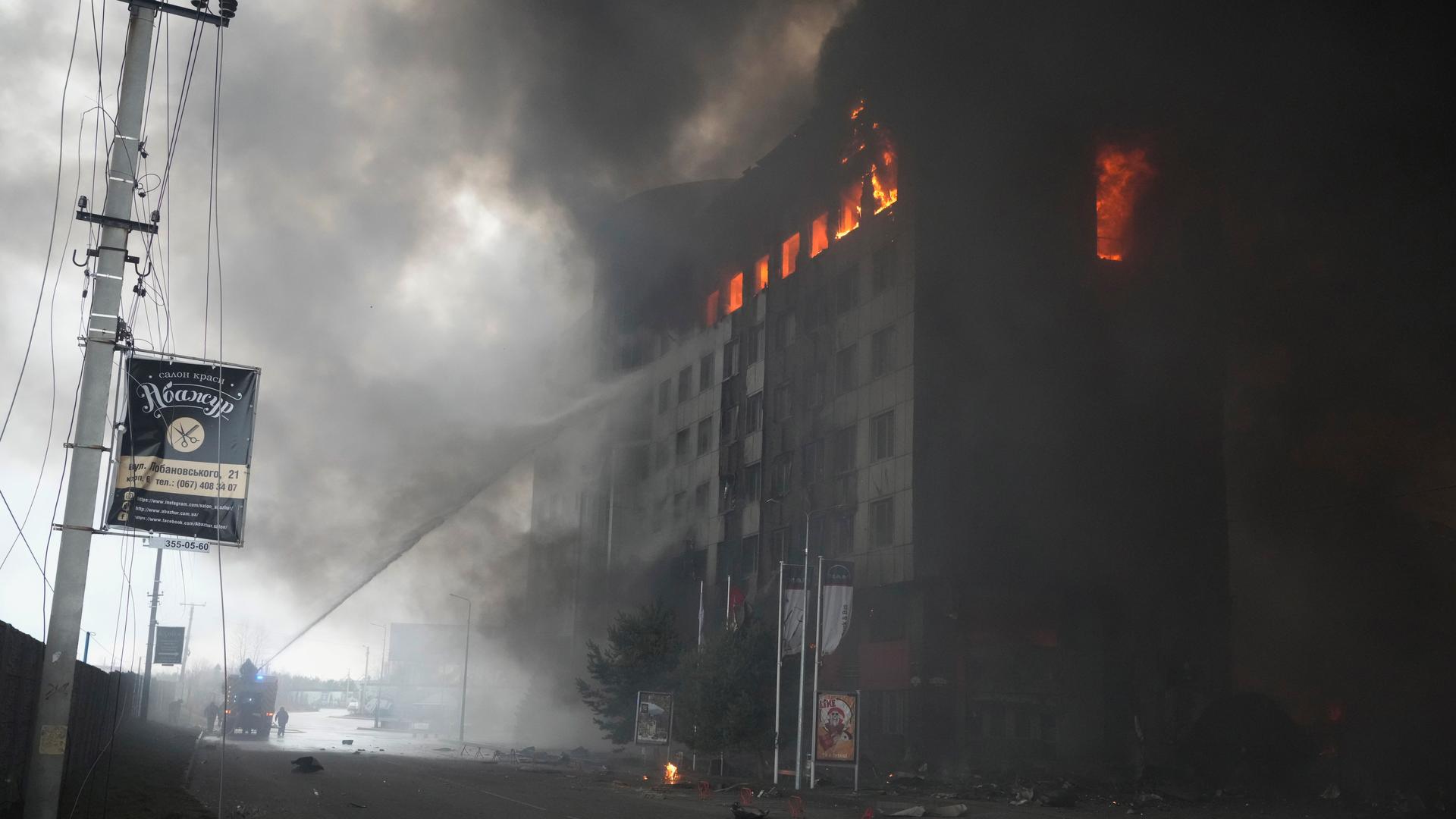For 27-year-old Majd Khalaf, Russia’s invasion of Ukraine has brought back memories that he’s tried to forget.
“For me and many Syrians, it’s really traumatic because we know exactly what Russia will do,” Khalaf said last week.
Khalaf was an engineering student at the University of Aleppo when the war in Syria began in 2011. He was 19 when he joined the protests in the hopes of bringing about democratic change.
Related: Ukrainians abroad return to defend their homeland
Assad’s government used brutal tactics against protesters, and enlisted the help of a regional ally, Iran, to crush the opposition. But to stay in power, Assad eventually needed air support. That’s where Russia got involved.
Russia’s military involvement in Syria turned the tide in favor of the Syrian government, and it emboldened Russian President Vladimir Putin, some experts say.
“What’s happening to Ukraine is a result of what the world let Putin do to Syria,” Marwan Safar Jalani, a Syrian human rights scholar based in the UK, tweeted last week.
In a speech in 2015, Putin said his country was intervening in Syria at the request of Assad. Putin said the goal was to go after ISIS terrorists.
But in reality, Russian jets targeted opposition areas indiscriminately.
Related: ‘The Kremlin really controls the armed forces of Belarus,’ analyst says
Khalaf, the engineering student, joined a group of volunteers called the White Helmets. They were often the first on the scene after Russian airstrikes. Khalaf said the recent videos from Ukraine remind him of his experience in Syria.
“It was the same happening in Syria when the Russian and Assad regimes used to target the first responders, the ambulance, civilian homes, market,” he explained.
In 2019, an investigation from The New York Times revealed that the Russian Air Force repeatedly bombed hospitals in Syrian opposition areas.
“Air power in Syria was decisive,” said Jennifer Cafarella, a national security fellow at the Institute for the Study of War. “The Assad regime’s air force was quite limited, and so, what the Russians were able to bring was a core capacity to increase, essentially, the level of destruction and the level of violence from the air — which is something that neither Assad nor the Iranians could provide and, ultimately, did have a devastating effect on the Syrian opposition.”
Russia had other interests too, she added. It used Syria as a testing ground for weapons, some of which it is using in Ukraine today.
This week, Human Rights Watch and Amnesty International said that Russian forces appeared to have used widely banned cluster munitions. An unnamed US defense official told reporters that Russia has deployed launching systems capable of sending thermobaric rockets at Ukrainian targets.
Related: The invasion in Ukraine could mean less reliance on energy from Russia, analyst says
“Thermobaric bombs are known as vacuum bombs. They suck oxygen into the blast and can cause awful internal injuries, especially to the lungs. We have seen this before from Russia, especially in Aleppo, Syria,” tweeted Catherine Philp, a correspondent with The Times of London.
Russia used different cruise missiles and weapons systems in Syria, Cafarella of the Institute for the Study of War explained.
“They’ve even been piloting some advanced, anti-drone capabilities at their air base to try and protect that air base from attacks,” she said. “So, there’s a wide variety of both ways of fighting and capabilities that the Russians have tested and improved upon in Syria.”
The US condemned Russia’s involvement in Syria, but Cafarella said Washington could have done a lot more, like imposing sanctions, just as it is doing now. It also could have given the Syrian opposition more support, she added.
For Syrians like Salma Almidani, the international community’s response fell short, and it made them feel like the country was being abandoned.
Almidani, who was born and raised in Damascus, empathizes with people in Ukraine today.
“We know what displacement is like,” she said. “We know what it’s like to have bombs rain down on you. We know what it’s like to have to hide in shelters, we know what it’s like to not know where to go.”
Almidani fled the war and resettled in the US, where she studied public health. Now, she is hearing about Syrians with medical backgrounds getting ready to help those in Ukraine.
Related: Poland prepares to accept thousands of refugees from Ukraine
“I’ve seen doctors who worked in field hospitals in Aleppo already ask, ‘Are there any medical missions to Ukraine right now?’ Our hospitals were bombed when they were above the ground. What happened is a lot of hospitals went underground,” she said.
Russia’s involvement in Syria hasn’t been limited to the battlefield. Pro-Kremlin propaganda and misinformation has flooded digital platforms. Russian trolls went after the White Helmets, the volunteer rescue group, accusing them of staging attacks and being part of terrorist groups.
“Syria emboldened Russia,” said Muhammad Najjar, who fled Syria in 2012. “Putin’s ego grew vastly in Syria. He felt he can do anything, he can destroy, he can kill, he can use whatever weapons with full impunity.”
Najjar lived in a refugee camp in Turkey and recently resettled in the US where he is studying at Columbia University. He said it saddens him that the Russian government didn’t face repercussions for its actions in Syria and that it continues to support the Assad government to this day.
He hopes that Russia’s invasion in Ukraine will bring a more decisive response from the international community.
“Syria paid a heavy price,” Najjar said. “We paid in blood.”
